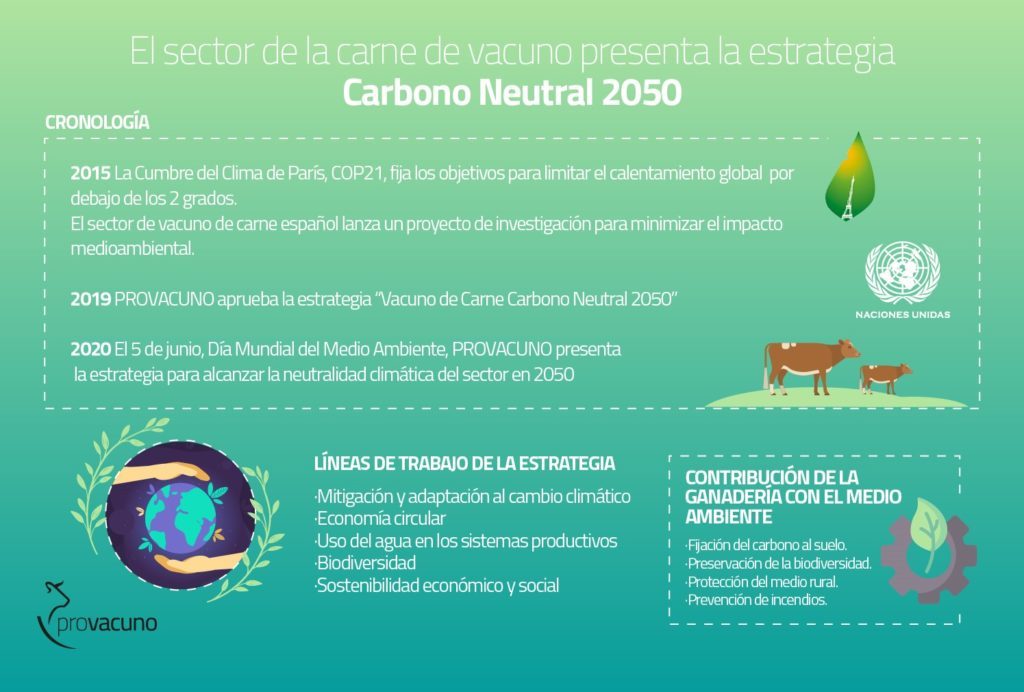PROVACUNO, the Interprofessional Organization of Beef, has launched the 2050 Carbon Neutral Beef Strategy on the occasion of World Environment Day, which is celebrated today, June 5, and with the aim of achieving climate neutrality in the sector in 2050. An initiative approved in 2019 by the organization’s governing bodies to commit to reducing emissions and improving environmental sustainability.
The beef sector in Spain, to which the latest inventory data from the Ministry of Ecological Transition and Demographic Challenge made public last March, account for just 3.6% of total greenhouse gas emissions in our The country has decided to take a proactive role to guarantee respect for the environment. To this end, it has been promoting various research and technological development activities since 2015 to achieve the objectives agreed at the global level at the Paris Climate Summit, COP21, in 2015.
The beef sector in Spain causes just 3.6% of total greenhouse gas emissions in our country
The Carbon Neutral Beef strategy includes measures and actions such as continuous research and innovation, with the launch, throughout 2020, of some initiatives. Among them, some codes of good practice, in collaboration with Spanish researchers who work on climate change mitigation in the agricultural sector, and grouped around the REMEDIA group, or a socioeconomic characterization of the sector, as a basis to guide precisely innovation activities.
As Javier López, PROVACUNO Director, assures: “The beef cattle sector is committed to achieving climate neutrality by 2050, and we are going to achieve it. For example, in the last two decades we have managed to reduce emissions associated with manure by 18%. Our compliance with regulations and the recognition of this effort by society and consumers will contribute to achieving economic and social sustainability in the sector and to guarantee an essential activity to conserve the rural environment ”.

How the sector will work to enhance sustainability
PROVACUNO has included in its strategy a series of lines of action in which it will act in the short, medium and long term, such as mitigation and adaptation to climate change; the boost to the circular economy; the push to biodiversity; a more rational and efficient use of water; and the search for sustainability, both economic and social.
Since 2015, the entire Spanish beef cattle sector has been working to reduce polluting gas emissions. With current scientific knowledge and the speed with which progress has been made in this area in recent years, the sector considers it realistic to be able to achieve climate neutrality by 2050, reducing emissions and increasing carbon sequestration.
A sector that is already very important for the environment, since livestock farming is essential for carbon fixation in the soil, for the preservation of biodiversity and for protecting the environment in rural areas, especially in protected areas, as well as to collaborate in fire prevention.
Since 2015, the entire Spanish beef cattle sector has been working to reduce polluting gas emissions. With current scientific knowledge and the speed with which progress has been made in this area in recent years, the sector considers it realistic to be able to achieve climate neutrality by 2050, reducing emissions and increasing carbon sequestration.
“PROVACUNO’s work with the Spanish research groups and with the NGOs that want to build with us the future of the Spanish rural environment will allow us not only to apply a series of sustainable measures, but also to transform it into a system of good practices that manages to achieve the objective of a carbon neutral and sustainable sector, which is so necessary for our planet ”, concludes Javier López, with his sights set on 2050.
















